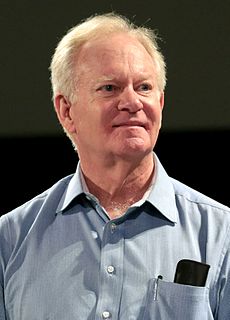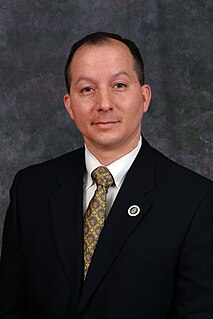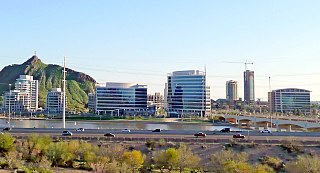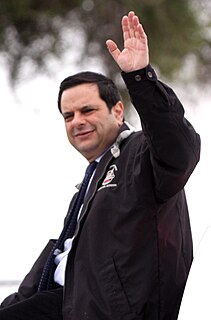
John Fife Symington III is an American businessman and politician. In 1990, he was elected to serve the first of two consecutive terms as the 19th governor of Arizona. During his second term, Symington resigned from the office of governor, following a conviction on charges of extortion and bank fraud – a conviction which was later overturned. Prior to his entry into politics, Symington served in the United States Air Force and was stationed at Luke Air Force Base near Glendale, Arizona. He is a member of the Republican Party.

The Arizona state elections of 2006 were held on November 7, 2006. All election results are from the Arizona Secretary of State's office. Percentages may not add to 100 because of rounding.

The 2010 South Carolina gubernatorial election took place on November 2, 2010. Incumbent Republican Governor Mark Sanford was term limited and unable to seek re-election. Primary elections took place on June 8, 2010 and a runoff election, as was necessary on the Republican side, was held two weeks later on June 22.

United States gubernatorial elections were held on November 2, 2010 in 37 states and two territories. As in most midterm elections, the party controlling the White House lost ground. Democrats did take five governorships from the Republicans, and Republicans took 11 governorships from the Democrats. An independent won one governorship previously held by a Republican. A Republican won one governorship previously held by an independent. Republicans held a majority of governorships for the first time since before the 2006 elections. One state, Louisiana, had no election for governor, but did feature a special election for lieutenant governor.

United States gubernatorial elections were held on November 3, 2009 in the states of New Jersey and Virginia as well as in the U.S. commonwealth of the Northern Mariana Islands on November 7, 2009. Both state governorships were previously held by Democrats elected in 2005, and as a result of the 2009 elections both are presently held by Republicans; the local Covenant Party maintained control of the governorship of the Marianas. These elections formed part of the 2009 United States elections.

The 2010 Connecticut gubernatorial election took place on November 2, 2010, to elect the 88th Governor of Connecticut. Incumbent Governor Jodi Rell had announced in a press conference in Hartford on November 9, 2009, that she would not seek re-election in 2010. The sites Cook Political Report and CQ Politics both rated the election as a toss up.

The 2010 Wisconsin gubernatorial election took place on November 2, 2010, to elect the Governor and Lieutenant Governor of Wisconsin. The 2010 Wisconsin partisan primary on September 14 determined which candidates advanced to the general election.

Richard Jason Satawk "R. J." Harris is a United States Army National Guard warrant officer, politician, law student and former Air Traffic Controller. He was a candidate for the Libertarian Party's 2012 nomination for President of the United States. In 2010, he unsuccessfully challenged incumbent Tom Cole for the Republican Party nomination in the primary election for Oklahoma's 4th congressional district. He ran as an independent candidate for the same congressional seat in 2012.

The 2010 Arizona state elections were held on November 2, 2010, with primaries on August 24, 2010. These include gubernatorial and both sides of Congress. A special election was also on May 18 for Proposition 100.

The 2012 United States Senate election in Arizona was held November 6, 2012, alongside a presidential election, other elections to the United States Senate in other states, as well as elections to the United States House of Representatives and various state and local elections. Incumbent Republican U.S. Senator Jon Kyl, the Senate Minority Whip, decided to retire instead of running for reelection to a fourth term. Republican U.S. Representative Jeff Flake won the open seat. As of 2019, this is the last election in which Republicans have won the Class 1 Senate Seat in Arizona.

The 2014 Arizona gubernatorial election was held on November 4, 2014, to elect the Governor of Arizona, concurrently with elections to the United States Senate in other states and elections to the United States House of Representatives and various state and local elections.

The 1994 Arizona gubernatorial election took place on November 8, 1994 for the post of Governor of Arizona. Fife Symington, the incumbent Republican Governor of Arizona, defeated the Democratic nominee Eddie Basha.

The 1990 Arizona gubernatorial election took place on November 6, 1990 for the post of Governor of Arizona. Republican Fife Symington defeated the Democratic nominee and Mayor of Phoenix Terry Goddard. Because no candidate received a majority of votes, a runoff election was held later on February 26, 1991, which Symington also won. This is the only election where Arizona used a runoff election.

A general election was held in the U.S. state of Arizona on November 4, 2014. All of Arizona's executive officers were up for election as well as all of Arizona's nine seats in the United States House of Representatives. Primary elections were held on August 26, 2014.

The 2018 Arizona gubernatorial election took place on November 6, 2018, to elect the governor of Arizona, concurrently with the election of Arizona's Class I U.S. Senate seat, as well as other elections to the United States Senate in other states and elections to the United States House of Representatives and various state and local elections.

The 1962 Arizona gubernatorial election took place on November 6, 1962. Incumbent Governor Paul Fannin ran for reelection against President of the Western Conference of United Funds Samuel Pearson Goddard in the general election, winning a third consecutive term, a first for a Republican Governor in Arizona. Fannin was sworn into his third term on January 1, 1963.

The 1964 Arizona gubernatorial election took place on November 3, 1964. Incumbent Governor Paul Fannin decided not to run for reelection to a fourth term as governor, instead deciding to successfully run for the United States Senate when incumbent U.S. Senator Barry Goldwater decided to run for President of the United States.

The 1966 Arizona gubernatorial election took place on November 8, 1966. Incumbent Governor Samuel Pearson Goddard ran for reelection to a second term as Governor, narrowly winning the Democratic Party nomination as he was challenged by Justice of the Peace Norman Green.
The 2020 United States Senate special election in Arizona will be held on November 3, 2020. Following the death of Republican U.S. Senator John McCain on August 25, 2018, Governor Doug Ducey was required by Arizona law to appoint a Republican to fill the vacancy in McCain's Senate seat. In September 2018, Ducey appointed former U.S. Senator Jon Kyl to fill McCain's seat until after the Special Election of November 2020, which will determine who will serve the remainder of the term until January 2023. Kyl did not complete his interim appointment, and resigned on December 31, 2018. On December 18, 2018, Ducey announced that outgoing U.S. Representative Martha McSally would be appointed to fill the seat following Kyl's resignation. McSally was sworn in as Arizona's junior senator on January 3, 2019. She had been the Republican nominee for Arizona’s Class I U.S. Senate seat in 2018, but lost that race to Democrat Kyrsten Sinema.



























